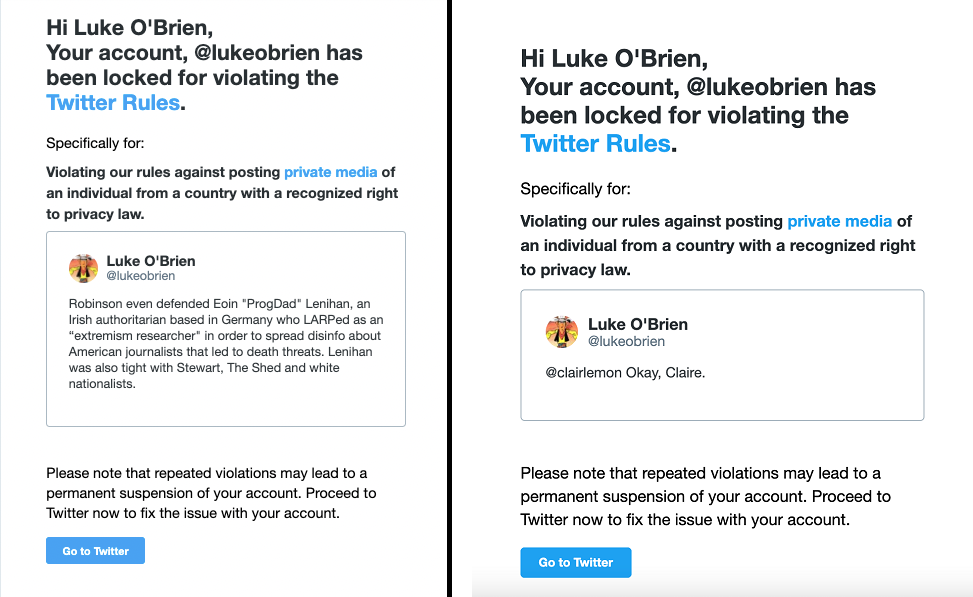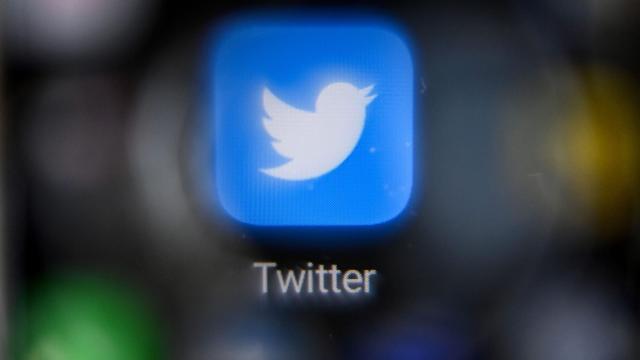Twitter’s new rule against posting “private media,” such as photographs and videos, depicting other people without their consent is already being exploited by fascists and white supremacists who are taking the opportunity to target anti-extremism researchers and activists.
On Tuesday, Twitter announced that it would be adding “media of private individuals without the permission of the person(s) depicted” to the list of information, such as home addresses, identity documents, and contact or financial information, that cannot be shared without consent. The rule is ostensibly intended to protect Twitter users from harassment. Twitter specifically mentioned demographics such as “women, activists, dissidents, and members of minority communities,” as well as specified it is “not applicable to media featuring public figures or individuals when media and accompanying Tweet text are shared in the public interest or add value to public discourse.” Other factors that it said it may take into account is whether the media involves a “newsworthy event” with “public interest value” or “is being covered by mainstream/traditional media.”
At the same time, the policy update raised some immediate red flags. Twitter is enforcing it retroactively, meaning that pretty much any user who has been around long enough could theoretically find themselves penalised. And not only is the Venn diagram of “newsworthy” and “information someone doesn’t want published” effectively a circle, but the neo-fascist movement also relies heavily on anonymity to avoid personal consequences for their public behaviour. Journalists who write about extremism regularly rely on tips from people outside the media, including academic and non-profit researchers, to expose the identities and behaviour of white supremacists and fascists. The reporting system also puts the onus on the reported account to justify why a piece of media was newsworthy or in the public interest after the fact. Twitter’s no doubt overburdened force of content moderators can’t possibly be expected to have an encyclopedic knowledge of the far-right, let alone the time to research each report extensively.
Twitter’s announcement thus immediately attracted the attention of far-right extremists who saw the opportunity to game the site’s moderation systems for revenge. According to Vice, one prominent neo-Nazi on messaging app Telegram told their followers, “Due to the new privacy policy at Twitter, things now unexpectedly work more in our favour as we can take down Antifa doxxing pages more easily. Anyone with a Twitter account should be reporting doxxing posts from the following accounts to deplatform.” The Washington Post reported that on white supremacist hub Gab, one user claimed to have filed over 50 reports with the comment, “It’s time to stay on the offensive.”
Atlanta Antifascists, one of the more prominent anti-fascist accounts on Twitter, tweeted on Thursday it had been reported for exposing the identity of a “White Student Union” organiser. It added Twitter had locked them out of their account until they deleted the post. A Twitter thread by researcher Chad Loder detailed numerous other examples, including a photojournalist who had been locked out of their account for what they said was a video, filmed in public, of two anti-vax organisers discussing tactics. Gwen Snyder, another anti-fascist organiser and researcher based in Philadelphia, told the Washington Post that their account was targeted over a 2019 photo of a mayoral candidate attending a rally with members of the neo-fascist, street-fighting Proud Boys organisation.
Many of the takedown notices posted by affected Twitter users referred to privacy laws in unspecified countries, regardless of whether the media was filmed in the U.S. and exclusively depicted U.S.-based persons. Some of the flagged media weren’t photos or videos, but screenshots of public posts. Since the Twitter policy requires a person reporting a “private media” violation to verify they are either one of the individuals depicted or a valid representative of them, that means Twitter is either acting on the whims of fringe extremists or incredulously accepting reports from their sympathizers at face value.
“Already, neo-Nazis are using the new policy to attempt to shut down their critics,” Atlanta Antifascists wrote in their public statement. “Twitter’s policy is an attempt to shield white power and far-right organisers from public scrutiny. It is unacceptable, but unsurprising.”
Another situation raises the question of whether the private media rule is exclusively responsible for the fiasco, or it simply alerted anyone listening to preexisting loopholes in its enforcement system. Luke O’Brien, formerly a senior reporter at the Huffington Post and currently a research fellow studying disinformation at Harvard’s Shorenstein Centre, told Gizmodo in a phone interview his account was locked in September over two posts referring to right-wing activists. The takedown notifications he received similarly referred to a “private media” rule and laws in other countries and stated he would not be allowed to regain account access until he deleted them, although the tweets he sent didn’t include non-public information or even attachments.
O’Brien told Gizmodo he had been locked out of his account for one tweet referring to Eoin Lenihan, a far-right social media user who the Columbia Journalism Review previously reported in 2019 had published data claiming to prove members of the media were antifa allies. O’Brien’s post referenced Lenihan’s residency in Germany, which Lenihan has made no secret of and is referred to on both his personal website and LinkedIn account (he lives in the “Stuttgart region” and lists several roles with German academia). The second tweet is even more baffling: O’Brien had responded to Claire Lehmann, the founding editor of amateur race-science magazine Quillette, with “OK, Claire.”

O’Brien forwarded emails showing his appeals to have the reports rescinded were denied, as well as multiple messages he had sent to Twitter personnel inquiring about the situation that received no response. He told Gizmodo he refused to delete the posts out of principle, as he didn’t want to self-censor his reporting.
“I posted public information that was already public. It’s very strange, right?” O’Brien told Gizmodo. “…You know, maybe some overburdened moderator made a mistake here, but like… obviously, I didn’t post any private media or media or anything. I don’t know what this rule is.”
“Twitter did not acknowledge my emails at all,” O’Brien said. That’s despite the penalty for the second post in which he did nothing but state Lehmann’s first name, he continued, being “patently absurd.”
“This is the fourth time these fuckers have done this to me,” O’Brien quipped. “Why is the Republican Party not protecting my free speech rights?”
Twitter founder Jack Dorsey, well known for his inscrutable and often baffling approach to managing the company and its stances on free speech, recently left the company. New CEO Parag Agrawal is reportedly launching a major reorganization of its corporate structure. There’s no indication the new rules are necessarily related to these changes.
Gizmodo reached out to Twitter several times, referencing multiple accounts which had been targeted in recent days under the “private media” rule. In response, Twitter spokesperson Trenton Kennedy wrote, “The Tweet in question was not in violation of our private information policy — our teams took enforcement action in error. We’ve sent a communication to the user noting this error.”
Kennedy didn’t respond to a follow-up question asking which tweet or account he was referring to, though he gave an identical statement to the Post indicating it was Snyder’s post. Kennedy did write that the company had been enforcing similar policies “in countries that have Right to Privacy laws for many years” and the new rule was an “expansion of those protections to everyone on Twitter.” He gave an example of a situation in which Twitter would have previously had “no policy basis for enforcement”: widespread sharing of photos of a rape victim located in a country with no right to privacy laws.
Twitter didn’t respond to additional inquiries concerning the status of O’Brien’s account.
“People who are not on Twitter associate the brand with harassment and cyber Nazis and deservedly so,” Michael Hayden, a senior reporter and spokesperson at the Southern Poverty Law Centre, told Gizmodo. “Twitter knows that this feeling of constant conflict is what keeps people clicking. That’s why they won’t get rid of [conspiracy theorist] Jack Posobiec, who used them to spread Pizzagate, Macron Leaks, and Stop the Steal.”
“That’s why they let disinformation peddler Andy Ngo dispatch his hateful followers to harass people,” Hayden added, referring to a provocateur who gained popularity in right-wing circles after he claimed to have been attacked by antifa at a rally. “Any new thing they add to the edges of Twitter, like Spaces, or a new policy to report content, is going to expose what the public already knows about Twitter’s core function — it is a culture war battlefield that favours the far right.”
